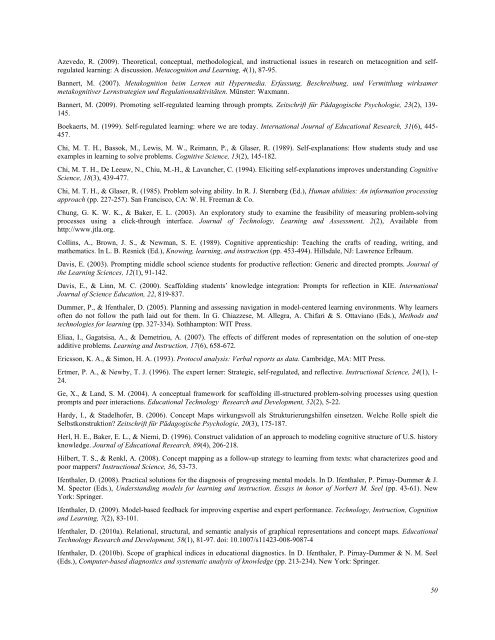January 2012 Volume 15 Number 1 - Educational Technology ...
January 2012 Volume 15 Number 1 - Educational Technology ...
January 2012 Volume 15 Number 1 - Educational Technology ...
You also want an ePaper? Increase the reach of your titles
YUMPU automatically turns print PDFs into web optimized ePapers that Google loves.
Azevedo, R. (2009). Theoretical, conceptual, methodological, and instructional issues in research on metacognition and selfregulated<br />
learning: A discussion. Metacognition and Learning, 4(1), 87-95.<br />
Bannert, M. (2007). Metakognition beim Lernen mit Hypermedia. Erfassung, Beschreibung, und Vermittlung wirksamer<br />
metakognitiver Lernstrategien und Regulationsaktivitäten. Münster: Waxmann.<br />
Bannert, M. (2009). Promoting self-regulated learning through prompts. Zeitschrift für Pädagogische Psychologie, 23(2), 139-<br />
145.<br />
Boekaerts, M. (1999). Self-regulated learning: where we are today. International Journal of <strong>Educational</strong> Research, 31(6), 445-<br />
457.<br />
Chi, M. T. H., Bassok, M., Lewis, M. W., Reimann, P., & Glaser, R. (1989). Self-explanations: How students study and use<br />
examples in learning to solve problems. Cognitive Science, 13(2), 145-182.<br />
Chi, M. T. H., De Leeuw, N., Chiu, M.-H., & Lavancher, C. (1994). Eliciting self-explanations improves understanding Cognitive<br />
Science, 18(3), 439-477.<br />
Chi, M. T. H., & Glaser, R. (1985). Problem solving ability. In R. J. Sternberg (Ed.), Human abilities: An information processing<br />
approach (pp. 227-257). San Francisco, CA: W. H. Freeman & Co.<br />
Chung, G. K. W. K., & Baker, E. L. (2003). An exploratory study to examine the feasibility of measuring problem-solving<br />
processes using a click-through interface. Journal of <strong>Technology</strong>, Learning and Assessment, 2(2), Available from<br />
http://www.jtla.org.<br />
Collins, A., Brown, J. S., & Newman, S. E. (1989). Cognitive apprenticship: Teaching the crafts of reading, writing, and<br />
mathematics. In L. B. Resnick (Ed.), Knowing, learning, and instruction (pp. 453-494). Hillsdale, NJ: Lawrence Erlbaum.<br />
Davis, E. (2003). Prompting middle school science students for productive reflection: Generic and directed prompts. Journal of<br />
the Learning Sciences, 12(1), 91-142.<br />
Davis, E., & Linn, M. C. (2000). Scaffolding students’ knowledge integration: Prompts for reflection in KIE. International<br />
Journal of Science Education, 22, 819-837.<br />
Dummer, P., & Ifenthaler, D. (2005). Planning and assessing navigation in model-centered learning environments. Why learners<br />
often do not follow the path laid out for them. In G. Chiazzese, M. Allegra, A. Chifari & S. Ottaviano (Eds.), Methods and<br />
technologies for learning (pp. 327-334). Sothhampton: WIT Press.<br />
Eliaa, I., Gagatsisa, A., & Demetriou, A. (2007). The effects of different modes of representation on the solution of one-step<br />
additive problems. Learning and Instruction, 17(6), 658-672.<br />
Ericsson, K. A., & Simon, H. A. (1993). Protocol analysis: Verbal reports as data. Cambridge, MA: MIT Press.<br />
Ertmer, P. A., & Newby, T. J. (1996). The expert lerner: Strategic, self-regulated, and reflective. Instructional Science, 24(1), 1-<br />
24.<br />
Ge, X., & Land, S. M. (2004). A conceptual framework for scaffolding ill-structured problem-solving processes using question<br />
prompts and peer interactions. <strong>Educational</strong> <strong>Technology</strong> Research and Development, 52(2), 5-22.<br />
Hardy, I., & Stadelhofer, B. (2006). Concept Maps wirkungsvoll als Strukturierungshilfen einsetzen. Welche Rolle spielt die<br />
Selbstkonstruktion? Zeitschrift für Pädagogische Psychologie, 20(3), 175-187.<br />
Herl, H. E., Baker, E. L., & Niemi, D. (1996). Construct validation of an approach to modeling cognitive structure of U.S. history<br />
knowledge. Journal of <strong>Educational</strong> Research, 89(4), 206-218.<br />
Hilbert, T. S., & Renkl, A. (2008). Concept mapping as a follow-up strategy to learning from texts: what characterizes good and<br />
poor mappers? Instructional Science, 36, 53-73.<br />
Ifenthaler, D. (2008). Practical solutions for the diagnosis of progressing mental models. In D. Ifenthaler, P. Pirnay-Dummer & J.<br />
M. Spector (Eds.), Understanding models for learning and instruction. Essays in honor of Norbert M. Seel (pp. 43-61). New<br />
York: Springer.<br />
Ifenthaler, D. (2009). Model-based feedback for improving expertise and expert performance. <strong>Technology</strong>, Instruction, Cognition<br />
and Learning, 7(2), 83-101.<br />
Ifenthaler, D. (2010a). Relational, structural, and semantic analysis of graphical representations and concept maps. <strong>Educational</strong><br />
<strong>Technology</strong> Research and Development, 58(1), 81-97. doi: 10.1007/s11423-008-9087-4<br />
Ifenthaler, D. (2010b). Scope of graphical indices in educational diagnostics. In D. Ifenthaler, P. Pirnay-Dummer & N. M. Seel<br />
(Eds.), Computer-based diagnostics and systematic analysis of knowledge (pp. 213-234). New York: Springer.<br />
50

















